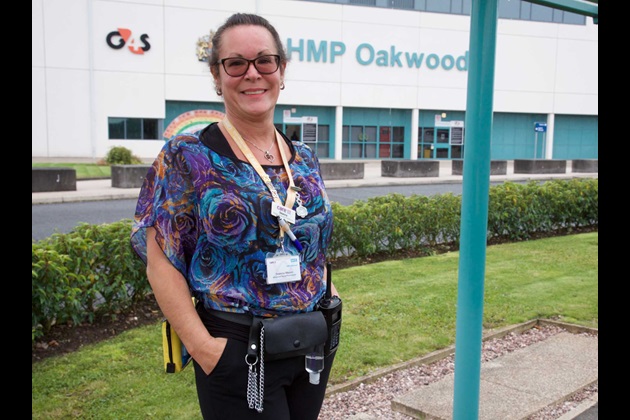Everyone deserves a dignified death, says prison nurse Deanna Mezen, who has worked tirelessly to give palliative care patients the choice of where and how they wish to die
“As a prison nurse, always see your patient as a patient, not a prisoner. That’s the best advice I’ve been given, and it’s always stuck with me,” says Deanna Mezen, an advanced clinical nurse practitioner at HMP Oakwood – a privately operated Category C male prison with a maximum capacity of just over 2,000 people.
“Mutual respect is fundamental to the care we give,” adds Deanna. “We don’t call people prisoners here – or numbers – people are people.”
After setting her sights on a career in midwifery, Deanna “fell” into respiratory nursing, then went on to medical assessment and rapid assessment clinic for urgent medicine, but following a severe back injury she turned to prison work. Now, more than a decade later, she can’t imagine working anywhere else.
Dynamic setting
Deanna relishes the prison environment and the versatility of her role. “I love medicine and prescribing and people. And working in justice nursing, I get to combine my favourite aspects of nursing within a dynamic setting.
“Being a prison nurse gives you multiple opportunities to stretch yourself in multiple ways. Yes, it can be challenging, but its rewards are often underestimated. And there’s a real opportunity for career progression.
“The easiest way to explain it is that all our nurses are practice nurses,” adds Deanna. “So you get to do a bit of everything. You never know what’s going to happen each day.”
Everyone is someone’s husband, son, uncle
Deanna is keen to point out that, despite the unpredictable nature of a day’s work, she never feels unsafe. “We are like a small village – staff and residents are all on first name terms. We aim to provide the same level of care as a person would get in the community.
"Everyone is someone’s husband, son, uncle. If any of my family ended up in prison I would like them to be treated with the same care I give my patients.”
Evaluating medical notes
Part of Deanna’s daily job is to review the most complex patients’ needs and to evaluate new prisoners’ medical notes. As a nurse prescriber she is responsible for all prescriptions, together with one other prescriber.
“It’s about 6,000 prescriptions a month. At the moment we also do COVID-age assessments to assess who might be at higher risk of complications.”
COVID-19 has, naturally, prompted the health care team to find different ways to treat people at the prison, but Deanna emphasises that this has never become an obstacle.
“Oakwood is a relatively new prison with telephones in all the cells, so we can actually call the prisoners and use telephone triage, where appropriate,” Deanna explains. “Some things have taken a little longer, but care has never been compromised. Making sure our men get the very best care is always our aim, pandemic or not.”
We aim to provide the same level of care as a person would get in the community
Oakwood is very supportive of new initiatives to improve health care within the prison, says Deanna. In one such initiative, she played a key role embedding the Macmillan Dying Well in Custody Charter at Oakwood and was rewarded with her company’s Nurse of the Year 2020 Award. This was followed up with a Butler Trust Award.
Her work implementing the charter is something she is particularly proud of as it allows her patients to have the death they want.
“That’s so important to me,” she adds. “I first learnt about the charter at a conference five years ago and we realised we were already using elements without realising. It helped give us the nudge to take it further and get it fully up and running.”
“Choice about where and how a person wants to die is key. It’s about ensuring their death is dignified,” Deanna explains. “Most of Oakwood’s palliative care patients have chosen to die in the prison – a lot of the residents see it as their home. The crucial thing here is they get to choose.”
Open-door policy
After two years of implementation, the charter is now in place – and making a positive impact. “My priority is continuity of care and we try to emulate what happens in the community,” Deanna explains. “If someone is coming to the end of life there is an open-door policy here.
“It’s enabled our residents to have friends around them at the very end of their life. In some cases, we’ve got them from their cells to be with them, and that’s been important for the person and for their friends too, so they get a sense of saying goodbye.”
My priority is continuity of care
Looking to the future, Deanna is keen to continue to promote prison nursing and support other prisons to get on board with the set-up at Oakwood.
“Receiving the Butler Trust Award has highlighted the charter to other prisons and I’m now being contacted by other justice nurses looking for advice. I’d urge other prisons to consider the charter – it’s worth the work involved for the huge difference it makes.”
Did you know?
The RCN's Nursing in Justice and Forensic Health Care Forum offers support and information for nursing staff working in prisons and other secure settings. Deanna has recently been appointed as a committee member.








